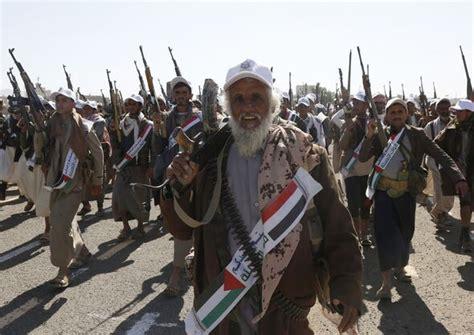
Houthis ‘declare war on the US’ after fierce Red Sea gunfight sinks several terror boats
Iran-backed Houthi rebels have “declared war on the West” with their terror attacks in the Red Sea, a former US ambassador has said, as he warned “self-defence” won’t be enough to deter the militia.
His comments come after the first deadly clash between the US and Tehran’s terror proxy took place in Yemen early on Sunday.
The US Navy scrambled attack helicopters after a Maersk container vessel sent out distress calls that it was under fire from the Houthis.
The militia then focused their fire on the choppers before the birds returned fire, sinking three ships and killing 10 fighters.
Mark Wallace said the US Navy destroying three Houthi boats in the Red Sea was a major turning point in the crisis.
The US Central Command described the US Navy’s response as “self-defence”, though Wallace, the former US ambassador to the UN, told The Sun that the time for self-defence has passed.
“The Houthis are basking in the glory of international attention,” he said.
“They are empowered, highly armed by Iran and they’ve showed no signs of stopping their attacks.”
Wallace insisted it was wrong to wait for a Houthi attack and said the United States “needs to send a clear message to the Houthis and to Iran that their Red Sea attacks are unacceptable”.
He continued: “It was a miscalculation to wait for them to attack. We need to change the rules of engagement – to make it clear if they get near US assets, we will destroy them.”
It comes amid a wave of Houthi attacks on ships travelling through one of the world’s biggest shipping lanes. Late on Saturday, a US warship was also forced to shoot down two ballistic missiles fired from Yemen.
The Houthis, who control a large part of Yemen, have said that in solidarity with Hamas, they will attack all vessels that they believe are linked to Israel or headed to Israeli ports.
Wallace, who is also chief executive of United Against Nuclear Iran says it is a “systematic effort by Iran and its proxies to attack the US and its allies – and it needs to be seen as that”.
He added that without Iran there would be no Houthis, and claimed Sunday morning’s events effectively show how “the US is now in a shooting war with Iran”, calling it “an act of major consequences”.
Retired US General Ben Hodges, who was formerly the commander of the US Army in Europe, agreed that taking direct action against the threat of the militia in the Red Sea was “long overdue”.
“We should have never gotten to this point,” he told the outlet.
“The US needs to squash them like a fly,” Hodges added.
“The Houthis are getting bolder and bolder… they have been probing and pushing to provoke a reaction – and now they’ve now found the point that the US will strike back”.
On Sunday evening, Houthi military spokesman Yahya Saree said that the US would “bear the consequences” of the attack on its vessels. The group also warned that any other countries that threatened them would face “negative repercussions”.
UK Defence Secretary Grant Shapps said: “This morning’s atrocious attacks by the Iranian-backed Houthis were an unacceptable and outrageous act designed to destabilise global trade. The Houthis must end their illegal campaign against merchant shipping and stop all violent attacks immediately.”
Britain’s military is said to be preparing to unleash a wave of air strikes against the militia.
Major shipping firms such as BP and Maersk are diverting vessels away from the Red Sea due to the regular attacks, prompting fears the crisis will drive soaring prices for goods and inflation.
“Those terrorists who are disrupting trade in the Red Sea are drinking in the last chance saloon,” Shapps warned.
He added: “Diplomatic efforts have been made to find a resolution but with limited success. We cannot allow one of the world’s key waterways that serve global trade to be held for ransom. Attacks on commercial shipping with drones and missiles is an attack on all of us and the culture and freedoms we cherish.”
The Red Sea is a vital shipping route between Europe and Asia as it allows ships to pass through the Suez Canal as opposed to travelling all the way around southern Africa.
Source » express.co.uk





